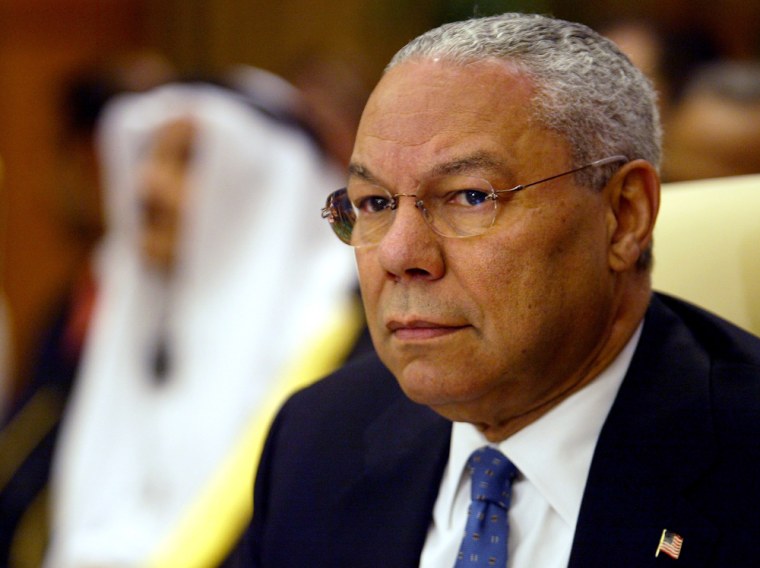An international conference on the political future of Iraq on Tuesday issued a final statement giving significant support to Ayad Allawi, the prime minister installed by the United States, by backing a “resolute” crackdown on “terrorism” in Iraq.
The final statement suggested that even opponents of the U.S.-led war recognized the need to contribute to its reconstruction.
“It is a world duty to save Iraq from its tragic situation,” Egyptian Foreign Minister Ahmed Aboul Gheit said.
The 20 nations attending the conference condemned “all acts of terrorism in Iraq,” as well as kidnappings and assassinations of foreign and Iraqi civilians, including aid workers, diplomats and journalists.
The final statement urged Allawi’s government to deal “resolutely” with terrorism but to avoid excessive force and hurting civilians.
The conference, which began Monday and ends Tuesday, brought together Iraq’s six neighbors — Iran, Syria, Turkey, Kuwait, Jordan and Saudi Arabia — plus Egypt and other Arab countries, the United States, China and bodies such as the Group of Eight and the European Union.
Some in the Arab world view the insurgency in Iraq as a legitimate resistance to U.S. occupation, and many Arabs have been angered by Iraqi deaths in fighting with U.S.-led forces.
Iraqi Foreign Minister Hoshyar Zebari defended the U.S.-led forces in Iraq. “The contribution of the multinational force is essential to help secure necessary conditions for voting and to support our security forces in stabilizing the country,” he said.
Aboul Gheit said the conference could not agree on what to say about military operations like the U.S. attack on the town of Fallujah this month, in which the United States says it killed more than 1,000 insurgents and did massive damage.
“There hasn’t been a full agreement on how to tackle that situation. A number of delegations raised the issue as the statements have shown, but others have also stated opposition ... The issue was left without a decisive conclusion,” he said.
Syria, Iran weigh in
Iran and Syria voiced criticism of the U.S.-led campaign against the insurgents. Syrian Foreign Minister Farouk al-Sharaa said while his government condemns terrorism, “we cannot overemphasize the need to refrain from shelling civilians, destroying cities and killing innocent people.”
Iranian Foreign Minister Kamal Kharrazi also criticized “the use of excessive force and bombing of towns.” But he also condemned the insurgent attacks and kidnappings, saying “such acts will help prolong the presence of foreign troops in Iraq.”
With the Iraqi government setting a Jan. 30 date for a crucial election, Zebari said his government was committed to holding “full, free and fair elections across the country for the first time in our history.”
The final communique urged the interim government to meet peaceful groups from across the political spectrum before the elections to encourage broad participation in the vote.
Bahrain told the conference it was willing to host a meeting of all Iraqi factions. Zebari told reporters his government had not yet considered the proposal.
“In principle, there is no objection. However, we believe that the best place to hold a reconciliation meeting is in the capital Baghdad,” Zebari said.
No deadline for U.S. withdrawal
The conference has steered away from setting a deadline for withdrawing U.S.-led forces from Iraq — despite a push by France and some Arab countries. The final communique, though, does say the mandate of foreign forces is “not open-ended.”
The conference’s final statement called on Iraq’s neighbors to “intensify cooperation” to control their borders against the infiltration of would-be insurgents, a top demand of the Baghdad government. Allawi told The Associated Press on Monday that neighboring countries had not pulled their weight against the insurgency.
U.S. Secretary of State Colin Powell told reporters he discussed the issue with his Syrian counterpart, and that Washington would provide Damascus with information that should be pursued.
“The Syrians have taken some steps recently, but we think there’s a lot more they can do,” Powell said.
Palestinian elections
On the sidelines of the main meeting, Powell, U.N. Secretary-General Kofi Annan, EU foreign policy chief Javier Solana and Russian Foreign Minister Sergey Lavrov met to discuss planned Palestinian elections and the stalled Israeli-Palestinian peace plan.
The four make up the “quartet” of sponsors of a Middle East peace plan known as the “road map.”
Powell arrived at Sharm El-Sheik after talks with Israeli and Palestinian leaders Monday morning. The Israeli government reassured him that it would do everything it could to facilitate Palestinian presidential elections on Jan. 9, including easing travel restrictions in the West Bank and the Gaza Strip.
